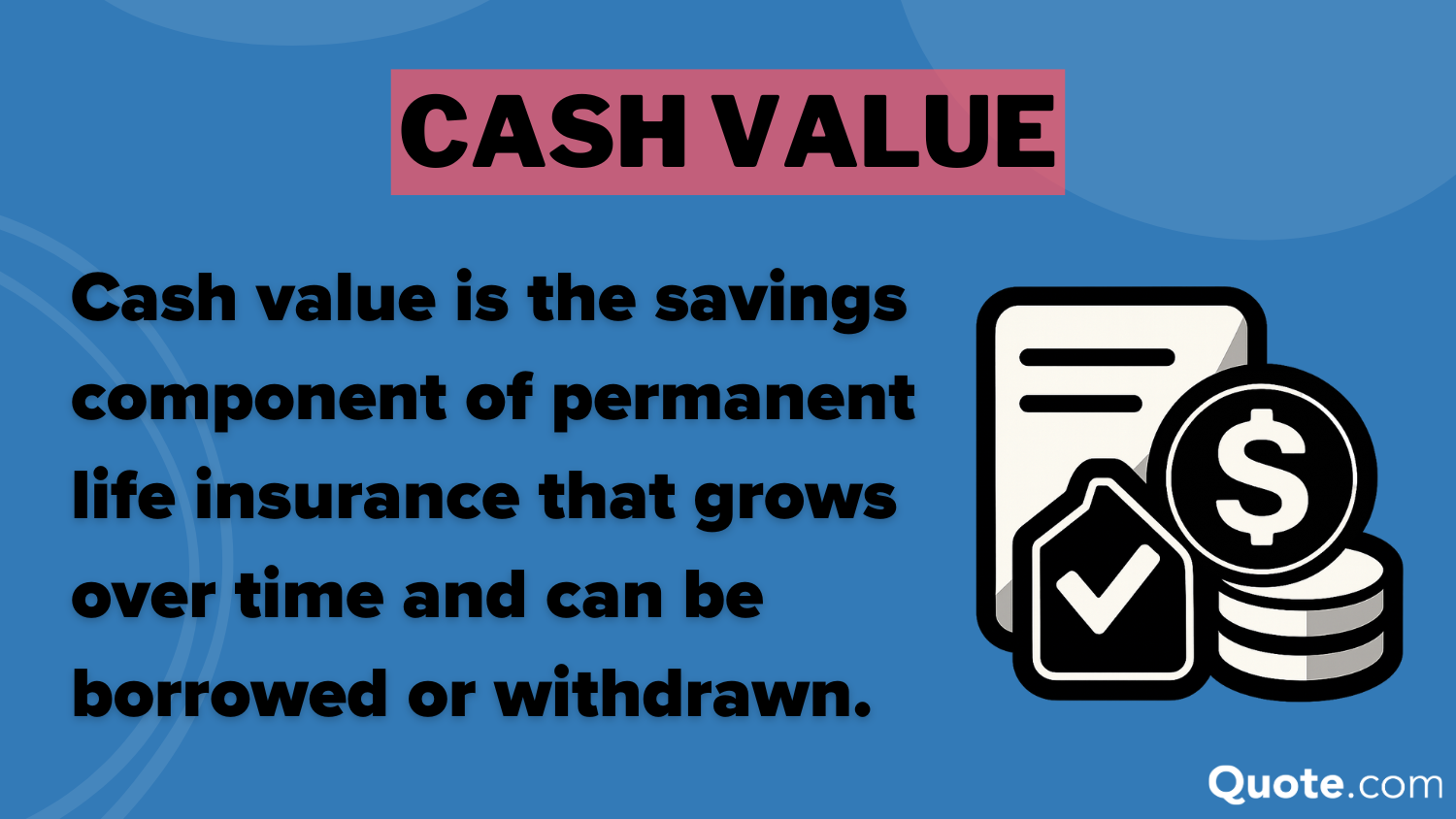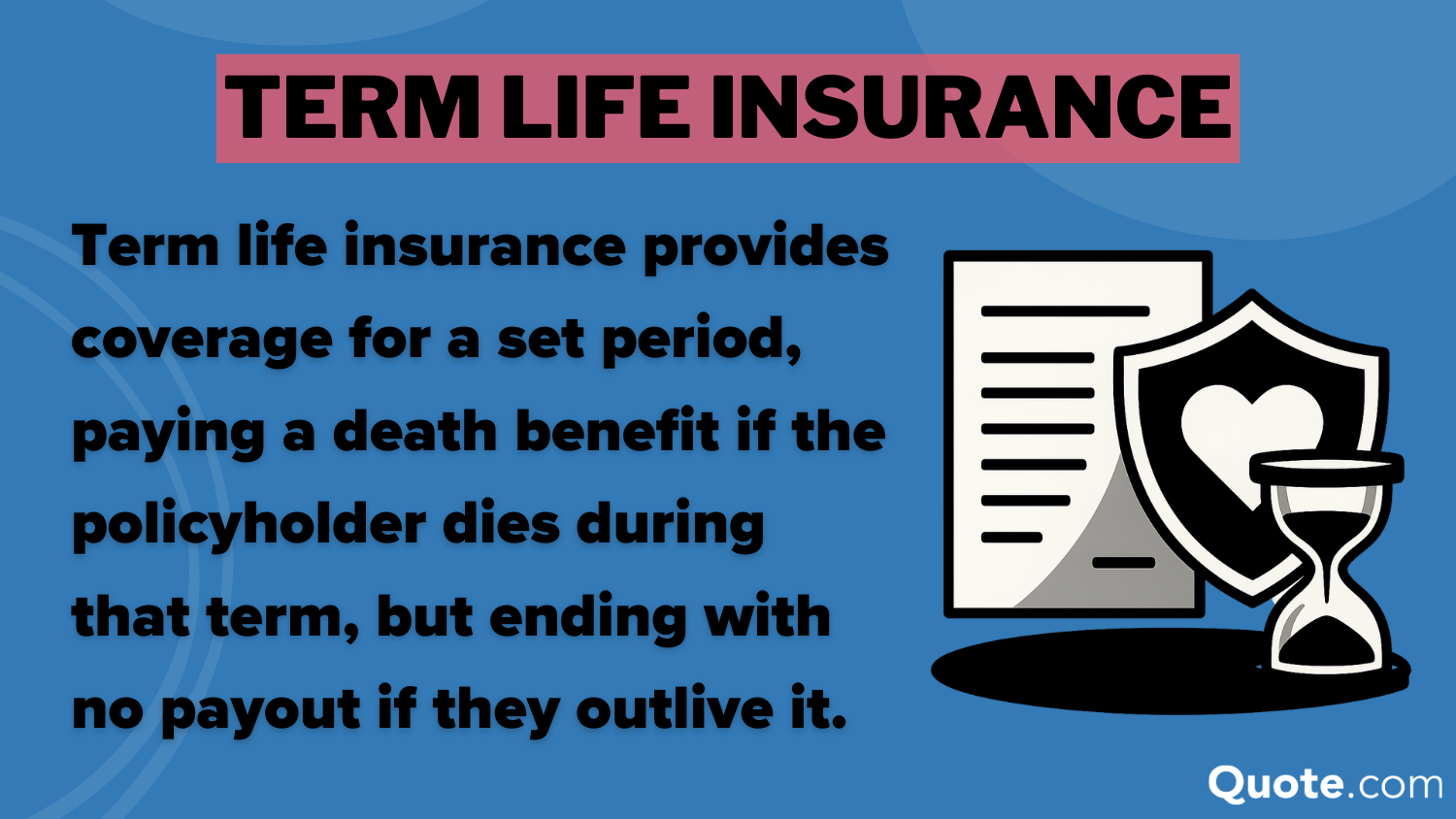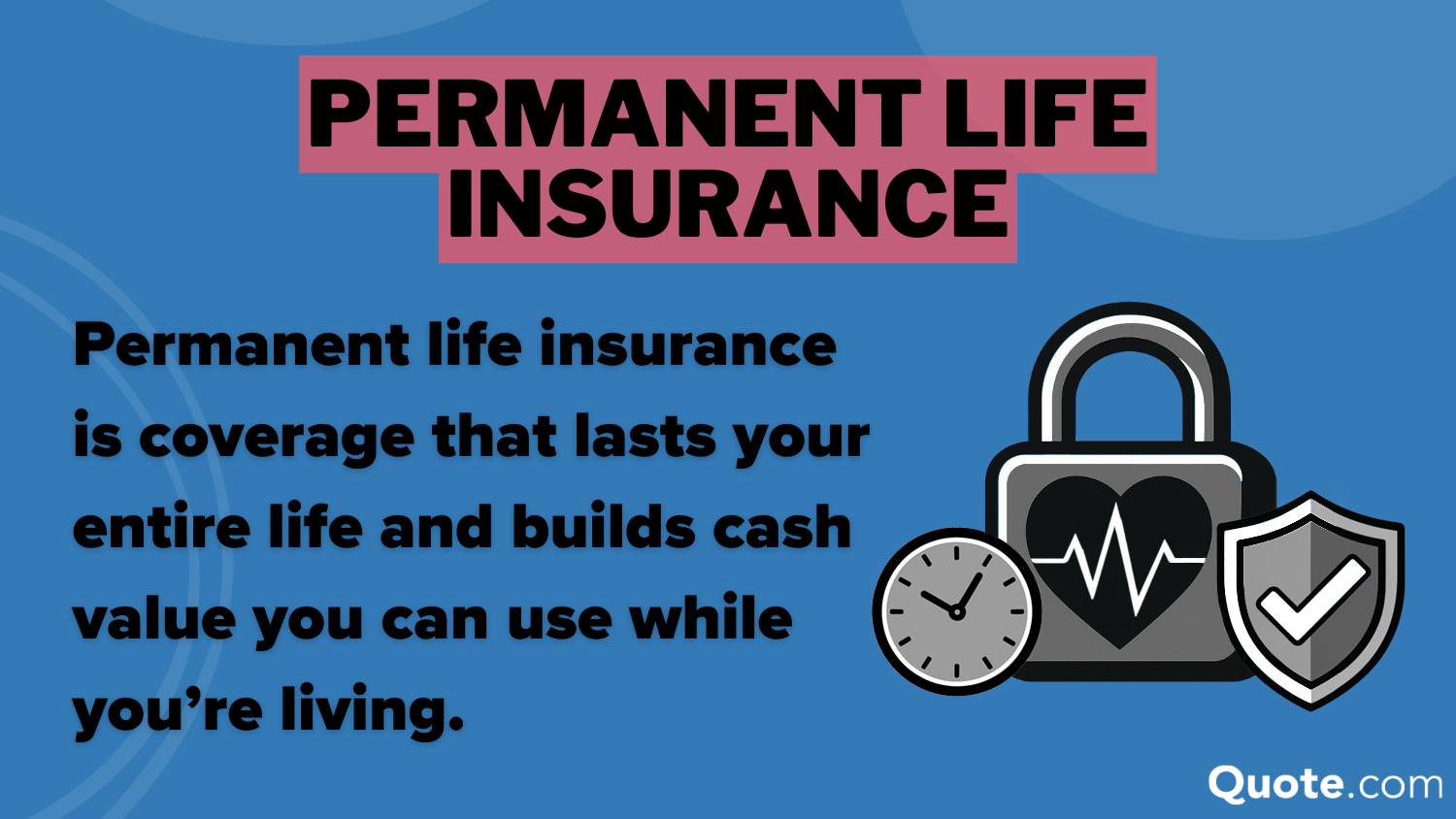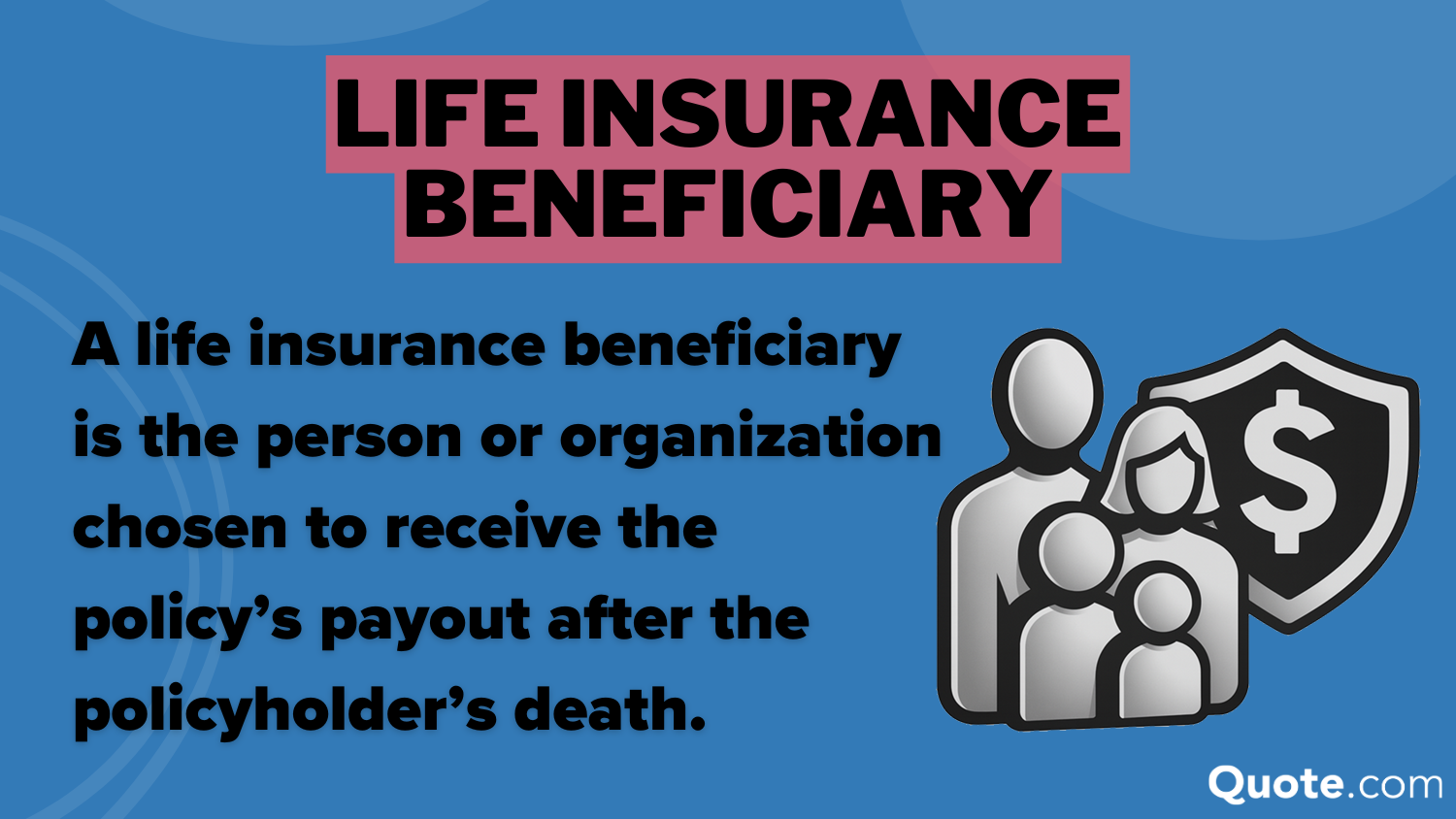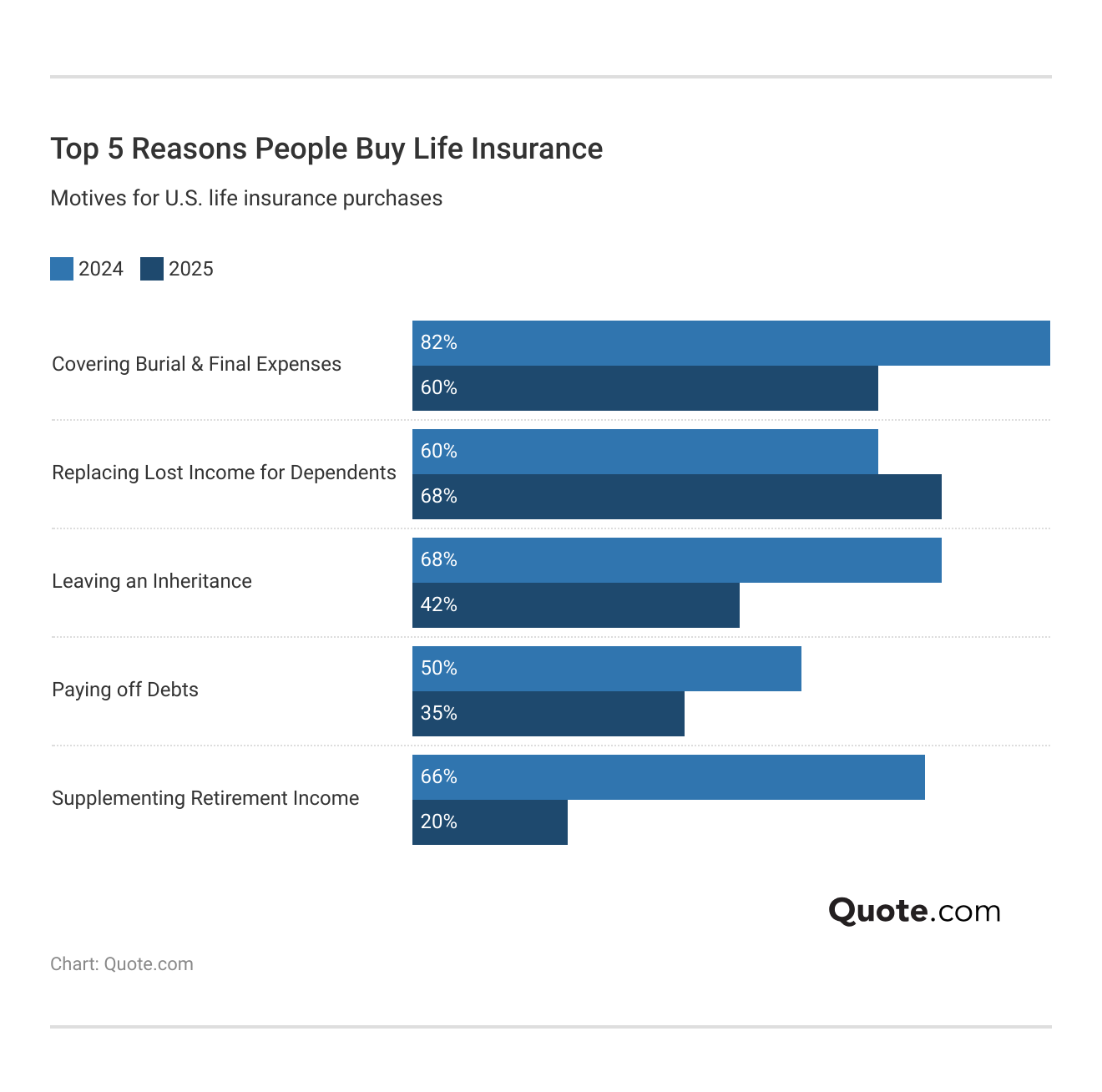Top 20 Reasons to Buy Life Insurance in 2026
The most common reasons to buy life insurance are to ensure financial stability for families while also providing long-term care. There are many reasons to buy life insurance, but increasing funeral costs and income replacement are the top two. Another reason to buy life insurance young is that rates are lower, starting at $29 a month for term life.
Read more Secured with SHA-256 Encryption




Table of Contents
Table of Contents


Head of Content
Meggan McCain, Head of Content, has been a professional writer and editor for over a decade. She leads the in-house content team at Quote.com. With three years dedicated to the insurance industry, Meggan combines her editorial expertise and passion for writing to help readers better understand complex insurance topics. As a content team manager, Meggan sets the tone for excellence by guiding c...
Meggan McCain


Managing Editor
Daniel S. Young began his professional career as chief editor of The Chanticleer, a Jacksonville State University newspaper. He also contributed to The Anniston Star, a local newspaper in Alabama. Daniel holds a BA in Communication and is pursuing an MA in Journalism & Media Studies at the University of Alabama. With a strong desire to help others protect their investments, Daniel has writt...
Daniel S. Young


Licensed Insurance Producer
Dani Best has been a licensed insurance producer for nearly 10 years. Dani began her insurance career in a sales role with State Farm in 2014. During her time in sales, she graduated with her Bachelors in Psychology from Capella University and is currently earning her Masters in Marriage and Family Therapy. Since 2014, Dani has held and maintains licenses in Life, Disability, Property, and Casualt...
Dani Best
Updated January 2026
The reasons to buy life insurance often come down to protecting your family, covering expenses, and building long-term financial security. Life insurance ensures that loved ones are financially supported, debts are managed, and future goals like education or retirement can still be met.
- Life insurance provides income replacement and debt protection
- Term life is temporary, while whole life builds cash value
- Policies can cover retirement needs and inheritance planning
In this life insurance guide, we’ll explain the basics of life insurance, explore the top reasons to get life insurance, and compare rates by policy type and health condition. Give your loved ones the gift of financial security by entering your ZIP code to find life insurance that fits your budget.
Why You Need Life Insurance Coverage
Life insurance is a financial protection that helps families plan for the future by covering big debts when the main breadwinner dies.
Whether you want to secure your home, cover your kids’ education, or leave a lasting legacy, there are many reasons to get life insurance.
Top 20 Reasons You Should Buy Life Insurance| Rank | Reason | Benefit |
|---|---|---|
| #1 | Income Replacement | Maintains family’s standard of living after death |
| #2 | Everyday Living Costs | Pays for essentials like food, utilities, transport |
| #3 | Mortgage Protection | Clears home loan to keep the house |
| #4 | Debt Settlement | Pays off personal debts and loans |
| #5 | Child Education Fund | Covers children’s schooling costs |
| #6 | Final Expense Coverage | Pays funeral and burial costs |
| #7 | Critical Illness Benefit | Payout if diagnosed with serious illness |
| #8 | Long-Term Care | Covers nursing or in-home care needs |
| #9 | Special Needs Care | Funds lifelong support for dependents |
| #10 | Stay-at-Home Parent Coverage | Pays for childcare & household help |
| #11 | Emergency Cash | Access cash value for urgent needs |
| #12 | Retirement Supplement | Provides extra retirement income |
| #13 | Asset Preservation | Prevents sale of assets for expenses |
| #14 | Business Continuity | Funds buyouts or pays business debts |
| #15 | Legacy for Heirs | Passes wealth or gifts to next generation |
| #16 | Tax-Advantaged Transfer | Transfers wealth With tax benefits |
| #17 | Estate Liquidity | Provides cash for taxes and legal fees |
| #18 | Insurability Preservation | Secures future coverage despite health changes |
| #19 | Cash Value Access | Withdraw or borrow during lifetime |
| #20 | Charitable Giving | Supports causes after passing |
Life insurance meets many different needs depending on your life stage, family situation, or financial goals.
Below, we’ve outlined the importance of life insurance, from covering daily costs to leaving a legacy for loved ones.
Income Replacement
When the main earner of the household dies, life insurance ensures that the family can keep paying bills and maintain their lifestyle. Income replacement helps your family by replacing your lost income and protecting loved ones from financial hardship.
However, it’s important to know how much life insurance you need since your coverage amount determines whether your family will have enough to pay for bills, debts, and other expenses.
Everyday Living Costs
Life insurance can cover groceries, utilities, transport and childcare. Everyday expenses like these don’t stop when you’re gone and having this coverage means your family won’t struggle to meet basic needs.
Mortgage Protection
A mortgage is one of the biggest debts most families carry. Life insurance can pay off the balance and prevent foreclosure, so your loved ones can stay in their home without financial stress.
Debt Settlement
Unpaid debts like car loans, student loans, or credit cards can be passed on to family members. Life insurance takes that burden off your loved ones by covering those costs so they don’t inherit debt.
Child Education Fund
Education is one of the biggest financial commitments parents face. Life insurance can set aside funds for tuition and other education expenses so your kids’ future opportunities aren’t cut short.
Final Expense Coverage
Funeral and burial costs can quickly add up, often reaching thousands of dollars. Final expense coverage is a type of life insurance that covers these expenses.
This policy helps pay for funeral arrangements, medical bills, and any remaining debts so your family can focus on healing rather than finances.
Term life insurance is great for affordability, while whole life builds value over time. The best choice depends on your financial goals, not just your current budget.
Jeff Root LICENSED INSURANCE AGENT
Final expense insurance is especially beneficial for seniors or those on a fixed income who want to ensure their affairs are in order.
With affordable monthly premiums and guaranteed acceptance options, these policies make it simple to protect your loved ones from unplanned expenses.
Long-Term or Special Needs Care
Nursing homes or in-home care can be expensive. Life insurance with long-term care riders helps pay for these services, protects your savings, and relieves the financial burden on your family.
Families with dependents who have lifelong special needs can have financial security through life insurance. Policies ensure care and resources for your dependents even after you’re no longer there to support them.
Critical Illness Benefit
Many policies offer riders that pay out if you are diagnosed with a serious illness such as cancer or heart disease. You can use the money for medical bills, treatments, or everyday expenses while you focus on recovery.
Adding riders will increase your premiums, so it’s important to compare the average cost of life insurance from different providers to find the best deal.
Stay-at-Home Parent Coverage
Stay-at-home parents contribute so much by providing childcare, managing the household, and supporting the family. Life insurance can help pay for childcare and household help if a stay-at-home parent passes away, making the transition easier for the family.
Emergency Cash
Some permanent life insurance policies build cash value that you can use in emergencies. This financial flexibility is a lifeline during unexpected situations like medical bills or job loss.
Retirement Supplement
Whole life and permanent policies can provide extra income in retirement. Policyholders can use accumulated cash value or dividends to supplement their retirement savings and live more comfortably.
In addition to boosting retirement income, some life insurance policies offer loan options that allow you to borrow from your policy’s cash value without penalty.
This can serve as a financial cushion for unexpected expenses or even help bridge income gaps during early retirement years.
By planning ahead, life insurance can act as both protection for loved ones and a dependable resource for maintaining your lifestyle later in life. Compare the benefits of whole vs. term life insurance here.
Asset Preservation
Life insurance can prevent the forced sale of assets like property or family heirlooms to pay for expenses or debts. Asset preservation keeps your legacy intact for your loved ones.
Business Continuity
Business owners use life insurance to protect their business like fund buyouts, pay off business debts, and keep the business running smoothly after the loss of a key owner or partner.
Legacy for Heirs
Life insurance can create a financial legacy for your children or grandchildren. The payout ensures wealth is passed on to the next generation, even if you didn’t accumulate considerable savings during your lifetime.
Cash Value Access
Permanent life insurance builds cash value over time, which you can borrow against or withdraw during your lifetime.
The cash value can help you manage financial needs during your lifetime while keeping your long-term protection intact.
This flexibility allows you to use funds for emergencies, education costs, home improvements, or even retirement income.
Unlike loans from a bank, borrowing from your policy doesn’t require credit checks or repayment schedules, although unpaid balances reduce your death benefit.
Tax-Advantaged Transfer
Many life insurance benefits are tax-advantaged, meaning your beneficiaries may receive more of the money without heavy tax deductions. Tax-advantaged transfer makes life insurance an efficient way to transfer wealth.
Estate Liquidity
Settling an estate can be expensive with legal fees and taxes. Life insurance provides the cash to cover these costs without using family savings or assets.
Insurability Preservation
Buying life insurance when you’re young and healthy locks in rates and coverage. Even if health problems arise later, your policy ensures you’re covered without higher premiums or being declined.
Charitable Giving
You can name a charity as your policy’s beneficiary so you can continue to support causes you care about and leave a lasting impact long after you’re gone.
The right life insurance policy can support your family’s financial security if you should pass, providing income replacement and even charitable giving.
If you want to learn more about your options, check out our guide to the best life insurance companies. It explains how to compare providers, and find affordable coverage that fits your goals.
With the right life insurance company, you can protect your loved ones and leave a positive mark that lasts for generations.
Free Life Insurance Comparison
Compare Quotes From Top Companies and Save
Secured with SHA-256 Encryption
Understanding Life Insurance Basics
Life insurance is designed to provide financial protection for your loved ones when you are no longer around. At its core, it is a contract where you pay regular premiums, and in return, the insurer pays a death benefit to your beneficiaries.
There are several types of life insurance, but the two most common are term life and whole life. Term life insurance provides affordable coverage for a set period, such as 20 or 30 years.
Alternatively, whole life is a type of permanent life insurance that includes a cash value component. It is more expensive than term coverage, but one of the main reasons to buy whole life insurance is for the additional cash value that can enhance an existing portfolio or be applied to premiums later in life.
Comparing Life Insurance Rates
The average cost of life insurance varies depending on policy type, age, health, and gender. Term life policies typically cost less and provide coverage for a set number of years, while whole life policies cost more but last a lifetime and build cash value.
Life Insurance Monthly Rates by Policy Type| Insurance Company | 20-Year Term | Whole Policy |
|---|---|---|
| $32 | $390 | |
 | $30 | $230 |
| $36 | $455 | |
| $33 | $472 | |
| $38 | $265 | |
| $39 | $475 | |
| $29 | $395 | |
 | $37 | $400 |
| $38 | $435 | |
| $30 | $380 |
Health status also plays a major role, with healthier applicants receiving lower rates compared to those with average or poor health. Younger adults often overlook coverage, but there are strong reasons to buy life insurance young, including lower premiums and the ability to lock in coverage while healthy.
20-Year Term Life Insurance Monthly Rates by Health Condition| Company | Excellent | Good | Average | Poor |
|---|---|---|---|---|
| $23 | $30 | $32 | $90 | |
 | $22 | $32 | $30 | $95 |
| $24 | $34 | $36 | $98 | |
| $20 | $28 | $33 | $90 | |
| $19 | $27 | $38 | $85 | |
| $21 | $29 | $39 | $88 | |
| $23 | $31 | $29 | $93 | |
 | $22 | $30 | $37 | $92 |
| $25 | $35 | $38 | $100 | |
| $22 | $30 | $30 | $94 |
These comparisons highlight how policy type and health both influence life insurance costs. A 20-year term policy is often the most affordable choice, especially for those in excellent health, while whole life insurance offers lifelong protection but at a higher price.
How to Use Life Insurance Protection
Life insurance is designed to provide financial stability for the people who matter most. From replacing lost income to helping cover education and living expenses, the right policy ensures your family can maintain their quality of life even after your passing.
Secure Property & Assets
Life insurance can help protect your home and preserve family assets. Whether it is paying off a mortgage, settling outstanding debts, or keeping valuable property intact, coverage provides a safeguard against financial loss.
How Life Insurance Protects Your Loved Ones| Purpose | How it Works | Who Benefits |
|---|---|---|
| Income Replacement | Supports family’s living standards after passing | Spouse, children, dependents |
| Child Education | Covers children’s education expenses | Children |
| Living Costs | Pays for food, utilities, transportation | Family members |
Life insurance also prevents the forced sale of property, pays down loans, and creates lasting financial security for heirs.
Securing Your Home & Assets With Life Insurance| Purpose | How it Works | Who Benefits |
|---|---|---|
| Mortgage Protection | Pays off home loan to keep the family home | Family, co-owners |
| Debt Settlement | Clears debts like car loans or credit cards | Co-signers, estate |
| Asset Preservation | Prevents selling assets to cover expenses | Heirs |
Protecting your home and assets ensures that your family keeps the stability you have worked hard to build. To learn how different policies compare, read our guide on how to get life insurance quotes.
Plan for Retirement
Life insurance is not only about protecting your family today. The right plan can supplement retirement savings and provide coverage for senior care while giving you the opportunity to leave something behind for your heirs.
Preparing for Retirement & Senior Care With Life Insurance| Purpose | How it Works | Who Benefits |
|---|---|---|
| Retirement Income | Provides cash value or annuities for retirement | Policyholder |
| Long-Term Care | Riders help fund nursing home or in-home care | Policyholder, spouse |
| Legacy Gift | Passes wealth or gifts to future generations | Grandchildren, heirs |
Policies can be structured to provide retirement income, help cover long-term care needs, and allow you to pass down a legacy gift. Learn more about life insurance beneficiaries to make the most of your policy.
Cover Final Expenses
From covering funeral expenses to offering access to emergency cash and providing tax benefits, these features make life insurance a valuable part of financial planning.
Building Financial Security With Life Insurance| Purpose | How it Works | Who Benefits |
|---|---|---|
| Final Expenses | Covers funeral and burial costs | Family, estate |
| Emergency Cash | Permanent policies build cash value for withdrawals or loans | Policyholder |
| Tax-Advantaged Transfer | Passes assets with possible tax benefits | Beneficiaries |
Whether it is managing final expenses or transferring assets efficiently, the right policy can make a lasting difference. Learn more about life insurance annuities.
Free Life Insurance Comparison
Compare Quotes From Top Companies and Save
Secured with SHA-256 Encryption
Top Reasons Families Get Life Insurance
The reasons people buy life insurance often shift as financial priorities change. Most policyholders cited burial costs and retirement income as top concerns.
These insights show that while covering final expenses remains important, life insurance is increasingly viewed as a tool for income protection and long-term wealth transfer. Compare whole life vs. term life insurance to see how different policies can work for you.
Many people wonder about the top reasons to get life insurance, but the most important are that it helps replace income, pay off debts, and cover final expenses.
Daniel S. Young Managing Editor
If you’re looking for affordable life insurance premiums, try our comparison tool and find the cheapest coverage that fits your needs.

Frequently Asked Questions
Why would you buy life insurance?
The main reason to buy life insurance is to protect loved ones financially by covering debts, replacing income, and paying final expenses after your passing.
Who needs life insurance?
Coverage is necessary when you have dependents, a mortgage, or debts to protect, or want affordable coverage while still young and healthy. Who is life insurance best suited for? Parents, homeowners, or business owners benefit most from life insurance protection.
Is it worth getting life insurance?
What we learned analyzing 815 insurance companies is that life insurance guarantees your family financial support, debt coverage, and security, making it a vital investment in protecting long-term stability. So, there’s no reason not to buy life insurance.
What is considered the primary reason for buying life insurance?
Funeral expenses and income replacement for dependents are the top two reasons people buy life insurance.
Who shouldn’t get life insurance?
People with ample retirement planning and those without dependents or outstanding debts won’t have many reasons to buy life insurance. However, getting a final expense policy to cover burial costs is still recommended.
What is the downside of life insurance?
The disadvantages of life insurance are its expensive premiums and confusing policy structures, especially with permanent policies that include cash value investments.
What should you not say when applying for life insurance?
Avoid hiding health conditions, smoking, or risky lifestyle habits, as false information can lead to denied claims or canceled coverage later.
Learn More: Single Premium Life Insurance
At what age should you buy life insurance?
Get life insurance in your 20s or 30s, when premiums are lower and health risks are minimal, making coverage more affordable and long-lasting. If you’re looking for affordable life insurance premiums, try our free comparison tool and find the cheapest coverage that fits your needs.
What are the benefits of life insurance while alive?
Life insurance can offer several living benefits beyond just the death payout. Some policies build cash value that you can borrow or withdraw during your lifetime, providing funds for emergencies, retirement income, or major expenses. Others include living benefit riders that help cover costs if you face a serious illness or need long-term care.
What is the best age for term life insurance?
The best age is your 20s or early 30s, when premiums are cheapest and coverage can span critical earning and family-building years.
Read More: The Millennials’ Guide to Health Insurance
How does life insurance help with retirement planning?
Why should I get life insurance in my 20s?
Get a FREE Quote in Minutes
Insurance rates change constantly — we help you stay ahead by making it easy to compare top options and save.

